
-
Find the right food for your petTake this quiz to see which food may be the best for your furry friend.Find the right food for your petTake this quiz to see which food may be the best for your furry friend.Featured products
 Hill's Science Diet Adult Oral Care Chicken, Brown Rice & Barley Recipe Dog Food
Hill's Science Diet Adult Oral Care Chicken, Brown Rice & Barley Recipe Dog FoodClinically proven kibble technology to reduce plaque & tartar build-up
Shop Now Adult Light Small Paws with Chicken Meal & Barley Dog Food
Adult Light Small Paws with Chicken Meal & Barley Dog FoodLow calories for less active small & mini dogs
Shop Now Adult Perfect Digestion Salmon, Whole Oats, and Brown Rice Recipe Dog Food
Adult Perfect Digestion Salmon, Whole Oats, and Brown Rice Recipe Dog FoodScience Diet's breakthrough nutrition supports ultimate digestive well-being & healthy microbiome
Shop NowFeatured products Adult 7+ Chicken Recipe cat food
Adult 7+ Chicken Recipe cat foodSupports energy level and beautiful fur in mature cats
Shop Now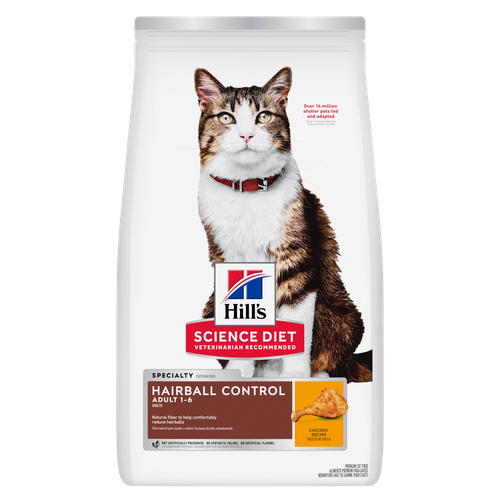 Adult Hairball Control Chicken Recipe Cat Food
Adult Hairball Control Chicken Recipe Cat FoodNatural fiber to help comfortably reduce hairballs
Shop Now Adult Perfect Weight Chicken Recipe Dog Food
Adult Perfect Weight Chicken Recipe Dog FoodOver 70% of dogs lost weight within 10 weeks when fed this nutrition (USA Study)
Shop Now -
Dog
- Dog Tips & Articles
-
Health Category
- Weight
- Food & Environmental Sensitivities
- Urinary
- Digestive
- Joint
- Kidney
-
Life Stage
- Puppy Nutrition
- Adult Nutrition
- Senior Nutrition
Cat- Cat Tips & Articles
-
Health Category
- Weight
- Skin & Food Sensitivities
- Urinary
- Digestive
- Kidney
-
Life Stage
- Kitten Nutrition
- Adult Nutrition
Featured articles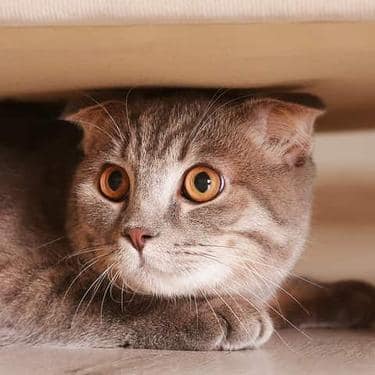 Keeping Pets Calm During Thunderstorms
Keeping Pets Calm During ThunderstormsIs your dog scared of thunder? Does your kitty dart under the bed at the first rumble? Learn a few tips for keeping your pets calm during the storm.
Read More How to Reduce Your Pet's Carbon Paw Print
How to Reduce Your Pet's Carbon Paw PrintHeaded outside? How you and your pets engage with nature can affect the environment, so here are some quick tips for reducing your pet's carbon paw print.
Read More Moving With a Pet: A How-To Guide
Moving With a Pet: A How-To GuideDiscover helpful tips for moving with your pet including safety recommendations to keep in mind on moving day & pet behavior to watch for at your new home.
Read More -


If your cat is having difficulty breathing and experiencing coughing fits, lungworms could potentially be the cause. Although lungworms are relatively uncommon in cats compared to intestinal parasites, if they're contracted, they can negatively impact your cat's health. Therefore, it's important to understand what these microscopic invaders do. Read on to learn more about what lungworms are and what cat lungworm treatment would consist of.
Understanding Lungworms in Cats
According to CriticalCareDVM, lungworms are parasites that live in and negatively impact the respiratory system of cats. Roundworms are the most common type of lungworm seen in cats, the two main species seen being Eucoleus aerophilus and Aelurostrongylus abstrusus.
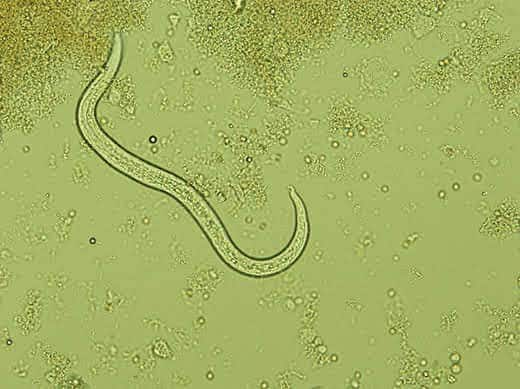
- Eucoleus aerophilus: This species lives in the windpipe (trachea) and large airways. Cats become infected with Eucoleus aerophilus by accidentally consuming parasitic eggs or larvae.
- Aelurostrongylus abstrusus: This species lives in the lungs, and it can infect cats if they have eaten a bird, rodent, frog or lizard that has recently eaten a snail or slug that contains the worms.
When a cat ingests the larval or egg stage of a worm, the larva develops in the intestine, migrates out of the intestines through the bloodstream and travels to the lungs, where it develops into an adult and lays more eggs. The eggs then hatch into larvae which are coughed up, swallowed and passed out in the feces where they are eaten by snails and slugs, and the cycle starts all over again.
Cats that hunt or scavenge, roam freely or live in multi-animal households are at higher risk for contracting lungworms than other cats.
Identifying the Clinical Signs
Clinical signs of lungworms in cats are usually related to the respiratory tract and associated with bronchitis or pneumonia. Some of these signs may include:
- Coughing (which may look like retching or attempting to vomit)
- Fast or abnormal breathing patterns
- Pale gums
- Wheezing
- Nasal discharge
- Increased sleep
- Decreased energy
- Decreased appetite
You may also find your cat hiding more, grooming less, or not wanting to jump or play like they normally do. In some cases, lungworms in cats may cause no signs at all and may only be diagnosed during a routine annual fecal exam by your veterinarian.


Tasty Tips
Diagnosing Lungworms in Cats
If your cat has any of the signs listed above, contact your vet to have your cat examined. It is likely that your vet will want a sample of your cat's feces so that it can be checked for worm eggs or larvae.
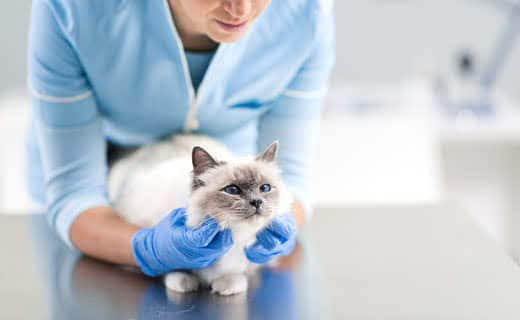
Your vet will conduct a full physical examination, and depending on what they learn, they may then recommend additional testing, which can include fecal exams to look for parasites or eggs, bloodwork to check for signs of infection and an evaluation of internal organ function.
In some cases, additional testing may be necessary to perform an inspection of the airways with a video camera (endoscopy), testing a sample of fluid from the lungs and following up with chest X-rays. Diagnosing a lungworm infection can be challenging for your vet because lungworms rarely shed their eggs in feces; therefore, patience and multiple fecal exams may be required.
A diagnosis of lungworms in cats is neither a life-threatening nor contagious situation. Because of this, cats that are suspected to have a lungworm infection are usually treated as outpatients. Still, it's recommended that you wear gloves while cleaning their litter box until your vet gives you the all-clear.
Cat Lungworm Treatment and Prevention
Treatment for lungworms is two-fold: Support the cat while they heal, and eliminate the parasite. Ivermectin and fenbendazole are the most common medications used to treat lungworms in cats. Topical treatments with selamectin have also been used. When treating a cat for lungworms, patience is advised. It may require up to two months of treatment to completely eliminate the infection.
If your cat has lungworms, the prognosis with treatment is usually excellent; however, the prognosis depends on the amount of damage done to the lungs as well as the age and health history of the cat. Kittens and cats with compromised immune systems are at the highest risk for developing issues with a lungworm infection, and chronic infections can cause significant inflammation in the lungs, leading to irreversible damage. To enable a full recovery, have your cat treated early.
The best way to prevent lungworms in cats is to prevent your cat from hunting or scavenging. If that's not possible, then having your cat's feces checked every six months for parasites is a good alternative. Otherwise, speak to your vet about other preventive measures to keep your cat free from internal parasites.
While lungworms can be difficult to treat, the good news is that they are relatively rare, and by working with your vet, you can maximize your cat's health and well-being — all while keeping them free of parasites.


Dr. Sarah Wooten graduated from UC Davis School of Veterinary Medicine in 2002. A member of the American Society of Veterinary Journalists, Dr. Wooten divides her professional time between small animal practice in Greeley, Colorado, public speaking on associate issues, leadership, and client communication, and writing. She enjoys camping with her family, skiing, SCUBA, and participating in triathlons.
Related products

Improves Everyday Ability to Get Up & Go

Over 70% of dogs lost weight within 10 weeks when fed this nutrition (USA Study)

Supports energy level and beautiful fur in mature cats

Natural fiber to help comfortably reduce hairballs
Related articles
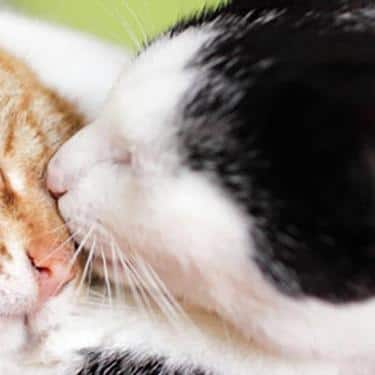
Learn the different factors that might be contributing to your cat's weight gain, and how bigger doesn't always mean better.
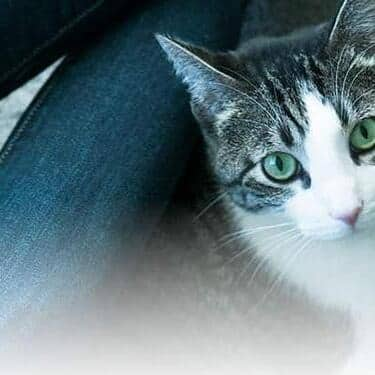
Brushing your cat's teeth is just as important as brushing your own. Learn signs or oral health problems in your cat and how to avoid them.

What is the best food for an overweight cat? Learn all about weight control food for cats, including what's in it and how it works.

Discover how to identify cat sensitive skin and what you can do to help your cat thrive from head to paw.

Put your cat on a diet without them knowing
Our low calorie formula helps you control your cat's weight. It's packed with high-quality protein for building lean muscles, and made with purposeful ingredients for a flavorful, nutritious meal. Clinically proven antioxidants, Vitamin C+E, help promote a healthy immune system.
Put your cat on a diet without them knowing
Our low calorie formula helps you control your cat's weight. It's packed with high-quality protein for building lean muscles, and made with purposeful ingredients for a flavorful, nutritious meal. Clinically proven antioxidants, Vitamin C+E, help promote a healthy immune system.

